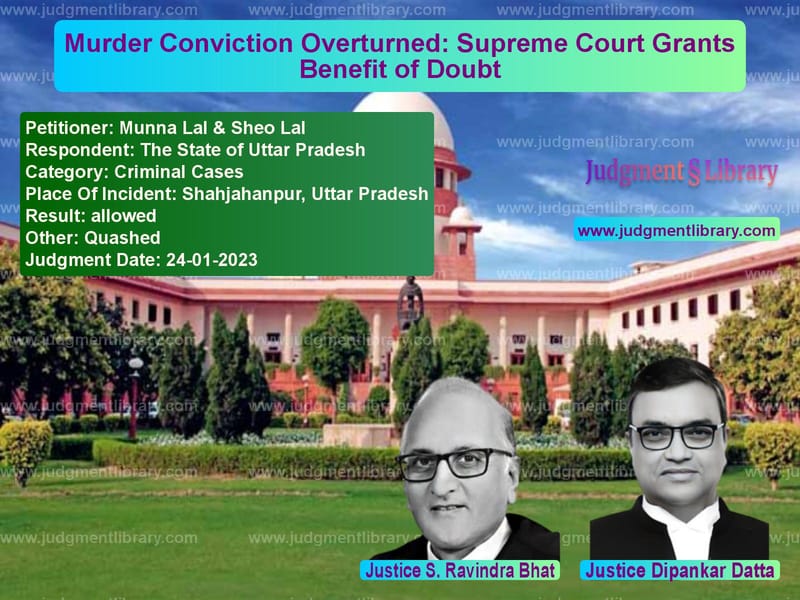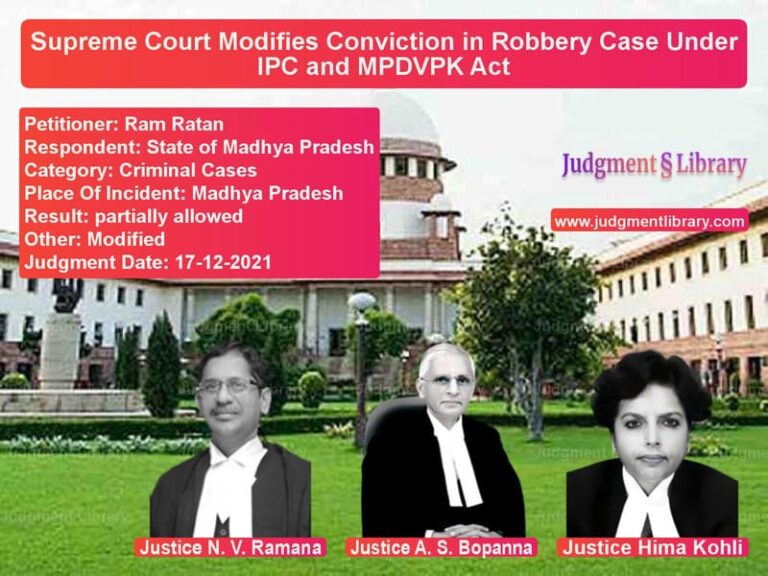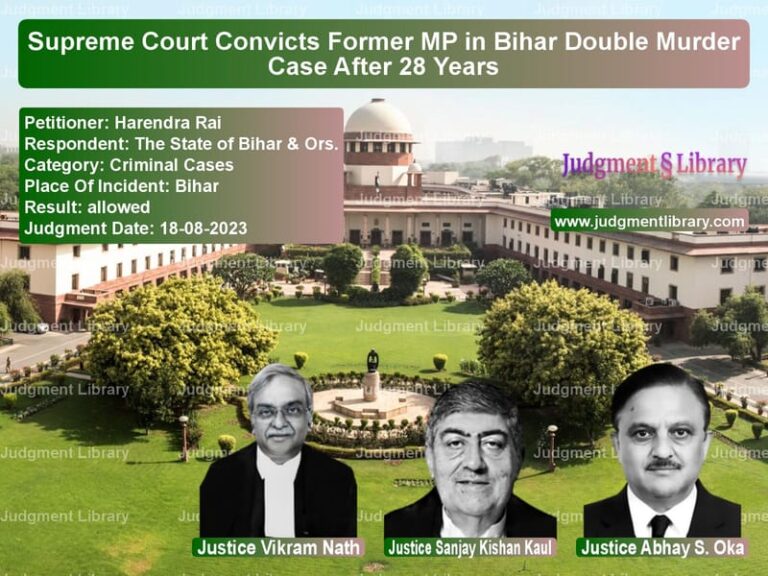Murder Conviction Overturned: Supreme Court Grants Benefit of Doubt
The case of Munna Lal & Sheo Lal v. The State of Uttar Pradesh is a landmark judgment where the Supreme Court overturned the murder conviction of two accused due to lack of conclusive evidence. The ruling clarifies the importance of establishing guilt beyond a reasonable doubt in criminal cases.
Background of the Case
The appellants, Munna Lal and Sheo Lal, were convicted for the murder of Narayan in Shahjahanpur, Uttar Pradesh, on 5th September 1985. The prosecution alleged that the appellants, along with two others, attacked Narayan using a gun, a locally made firearm (tamancha), a sharp-edged weapon (kanta), and a stick (lathi). The incident was reported immediately, leading to an FIR under Section 302 of the Indian Penal Code (IPC).
The trial court sentenced the accused to life imprisonment, which was upheld by the Allahabad High Court. However, Munna Lal and Sheo Lal challenged the ruling in the Supreme Court, arguing that their conviction was based on weak and contradictory evidence.
Legal Issues Considered
The Supreme Court examined the following key legal questions:
- Whether the prosecution proved the guilt of the accused beyond a reasonable doubt.
- Whether the trial court and High Court properly analyzed witness credibility.
- Whether non-examination of key witnesses and forensic evidence weakened the prosecution’s case.
Arguments by the Appellants (Munna Lal and Sheo Lal)
The appellants contended that:
- There was a long-standing enmity between the deceased and the accused, raising the possibility of false implication.
- The prosecution failed to present key witnesses, including Dr. Hanif (who recorded the FIR), Kedar, Chhange Lal, and Khemkaran, all of whom were claimed to have witnessed the murder.
- The investigating officer, who could have provided crucial clarifications, was not examined.
- The bullet recovered from the crime scene was not linked to any firearm belonging to Munna Lal.
- Their conviction was based on the testimony of only two eyewitnesses, whose statements had inconsistencies.
Arguments by the Respondent (State of Uttar Pradesh)
The State contended that:
- The trial court and High Court had thoroughly examined the evidence and found the appellants guilty.
- The testimonies of the two eyewitnesses were sufficient to establish the guilt of the accused.
- Minor flaws in investigation should not override the direct evidence provided by witnesses.
- Despite procedural lapses, the appellants were guilty of murdering Narayan, and their conviction should be upheld.
Supreme Court’s Judgment
The Supreme Court ruled as follows:
- Failure to prove guilt beyond a reasonable doubt: The Court held that inconsistencies in witness statements and lack of corroborative evidence created reasonable doubt.
- Non-examination of key witnesses weakened the case: The Court found that the failure to present independent witnesses and the investigating officer undermined the prosecution’s argument.
- Lack of forensic evidence linking the accused to the crime: The bullet recovered at the scene was not linked to any weapon owned by the accused.
- Benefit of doubt granted: The Court concluded that due to gaps in evidence, the accused were entitled to acquittal.
- Conviction set aside: The Supreme Court overturned the trial court and High Court judgments and ordered the immediate release of the appellants.
Analysis of the Judgment
The ruling reinforces key principles of criminal law, particularly the requirement to prove guilt beyond a reasonable doubt.
Implications for Criminal Law
- Establishes that circumstantial evidence alone is insufficient for conviction.
- Reinforces the need for corroborative evidence in serious offenses.
- Highlights the importance of forensic evidence in criminal trials.
Implications for Law Enforcement
- Emphasizes the necessity of thorough investigation and proper witness examination.
- Encourages courts to scrutinize procedural lapses in criminal trials.
Implications for Future Cases
- Sets a precedent for reviewing convictions based on weak evidence.
- Prevents wrongful imprisonment due to incomplete investigations.
- Reinforces the importance of due process in criminal trials.
Conclusion
The Supreme Court’s judgment highlights the fundamental principle that no person should be convicted unless their guilt is proven beyond a reasonable doubt. The ruling serves as a significant precedent in ensuring fair trials and preventing wrongful convictions.
Petitioner Name: Munna Lal & Sheo Lal.Respondent Name: The State of Uttar Pradesh.Judgment By: Justice S. Ravindra Bhat, Justice Dipankar Datta.Place Of Incident: Shahjahanpur, Uttar Pradesh.Judgment Date: 24-01-2023.
Don’t miss out on the full details! Download the complete judgment in PDF format below and gain valuable insights instantly!
Download Judgment: munna-lal-&-sheo-lal-vs-the-state-of-uttar-p-supreme-court-of-india-judgment-dated-24-01-2023.pdf
Directly Download Judgment: Directly download this Judgment
See all petitions in Murder Cases
See all petitions in Attempt to Murder Cases
See all petitions in Judgment by S Ravindra Bhat
See all petitions in Judgment by Dipankar Datta
See all petitions in allowed
See all petitions in Quashed
See all petitions in supreme court of India judgments January 2023
See all petitions in 2023 judgments
See all posts in Criminal Cases Category
See all allowed petitions in Criminal Cases Category
See all Dismissed petitions in Criminal Cases Category
See all partially allowed petitions in Criminal Cases Category







